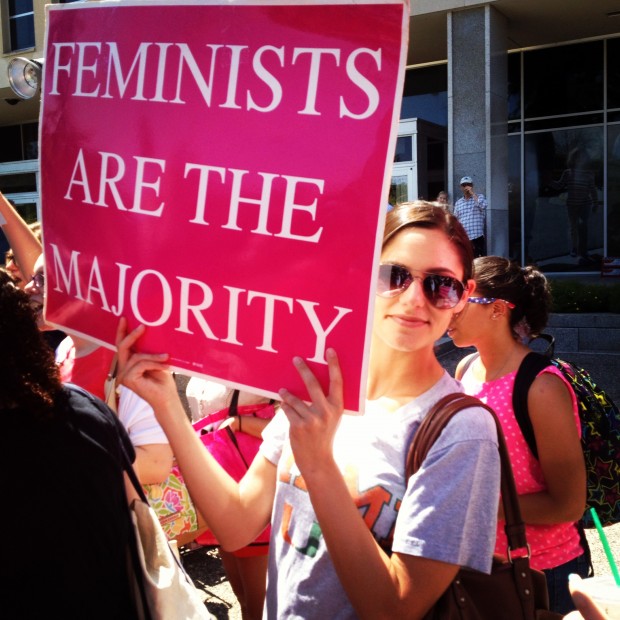It’s time to Meet The Team! In this series, the FMF Campus Organizers will talk a little bit about ourselves and also give you valuable organizing advice that we’ve picked up along our ways. Oh, and we’ll show you lots of photos of ourselves. Because that’s important.
I have always regretted that I didn’t get more involved in grassroots feminist efforts on my college campus. At some point during my freshman year, I got the idea in my head that I would be more useful to the feminist movement by studying feminist theory, LGBT studies, and political science than by getting involved with campus initiatives or feminist clubs; I thought that a 4.0 and a list of internships would be more valuable than on-the-ground organizing experience in the job market. Needless to say, this concept was inaccurate, and even a tad delusional, but it has helped me to be a better organizer now.

When someone mentions a college club or a local activism effort it is easy to imagine rallies, town hall meetings, and an exciting sense of community and empowerment. But when I begin to talk about my own experiences in organizing I don’t even know what to call the work that I did. In reality, I wore whatever hat was needed in order to make sure that the movements on the ground, the visible faces of change, were successful, and that the feminist presence was maintained on local, regional, national, and even political levels. In my first position, I was the Lobbying and Campaigning Assistant for a non-profit in London that supports the rights of LGBTQ young people; I created appointments and agendas so that the CEO and I could speak with members of parliament about the issue of homelessness among British LGBTQ youth, planned conferences, scheduled guest speakers, performed political research, drafted mass e-mails to communicate with members and donors, and managed supporter databases. (When I talk about my work in London, people always seem to focus on my lobbying experience. In reality, I learned much more about organizing and how social justice advocacy from my day-to-day tasks than from my conversations with MPs.)
When I returned to DC from my study abroad I decided to continue my non-profit work as an intern for Choice USA. In this position I was one step closer to the organizers on the ground: in addition to the type of work I did in London, I was also making calls to campus contacts, recruiting attendees for our student organizer conferences, creating curriculum for conference seminars, and organizing and performing my own reproductive justice training for DC interns. The conference attendees didn’t know that I helped create the curriculum they were learning, organize their travel, or plan the necessary conference materials. Instead, they saw the faces of the campus organizers who were teaching the seminars, the community leaders speaking on panels, and the club presidents who returned to their campuses with new knowledge about how to be a more effective organizer.
I don’t mind this lack of visibility; in fact I often enjoy it. I have the freedom to be creative, share innovative ideas, and take risks without large groups of organizers and whole communities watching me. At the same time, I worry that young people aren’t benefitting from my invisibility: knowledge of this level of the organizing process is key to sustaining the movement. If we didn’t have capable people to maintain databases, e-mail donors, plan conferences and fundraising events, support important political campaigns and legislation, track policies and current events, or manage campus groups and grassroots efforts, the exciting on-the-ground work would be much less effective.
As I’ve gotten to know the new campus team, I’ve been awe-struck by our differences: Kristy, Edwith, and I all have expertise in different aspects of the organizing process. Kristy has years of experience in grassroots campus work, including a position as the President of the Kutztown FMLA chapter. Edwith has experience recruiting a diverse group of individuals for local activist efforts, as exhibited through her work in the “No on 6” Campaign in Florida. But my experience has been at the macro level of feminist organizing, and it’s one young people seem to overlook when planning their futures in this movement.
At the risk of sounding extremely cheesy, we need conductors to orchestrate the efforts of all of the musicians so that they can play together in harmony: although the “invisible” part of organizing doesn’t always come with instant gratification, it helps ensure the long term endurance of the feminist movement and provides the leg work and orchestration behind many important grassroots efforts. This work has made me a better organizer because I understand the planning and development that has gone into any trainings I participate in, rallies I attend, or materials used to fundraise, recruit, or implement a campaign. I have even developed a better understand of the media campaigns or press conferences of organizations and politicians. These efforts aren’t just something to “like” or “share;” they are an important part of maintaining a feminist presence and keeping others involved, aware, and invested.
The work I do, and the work we all do, to keep the feminist movement alive and well, is important. Even the stuff that isn’t happening on the streets.

